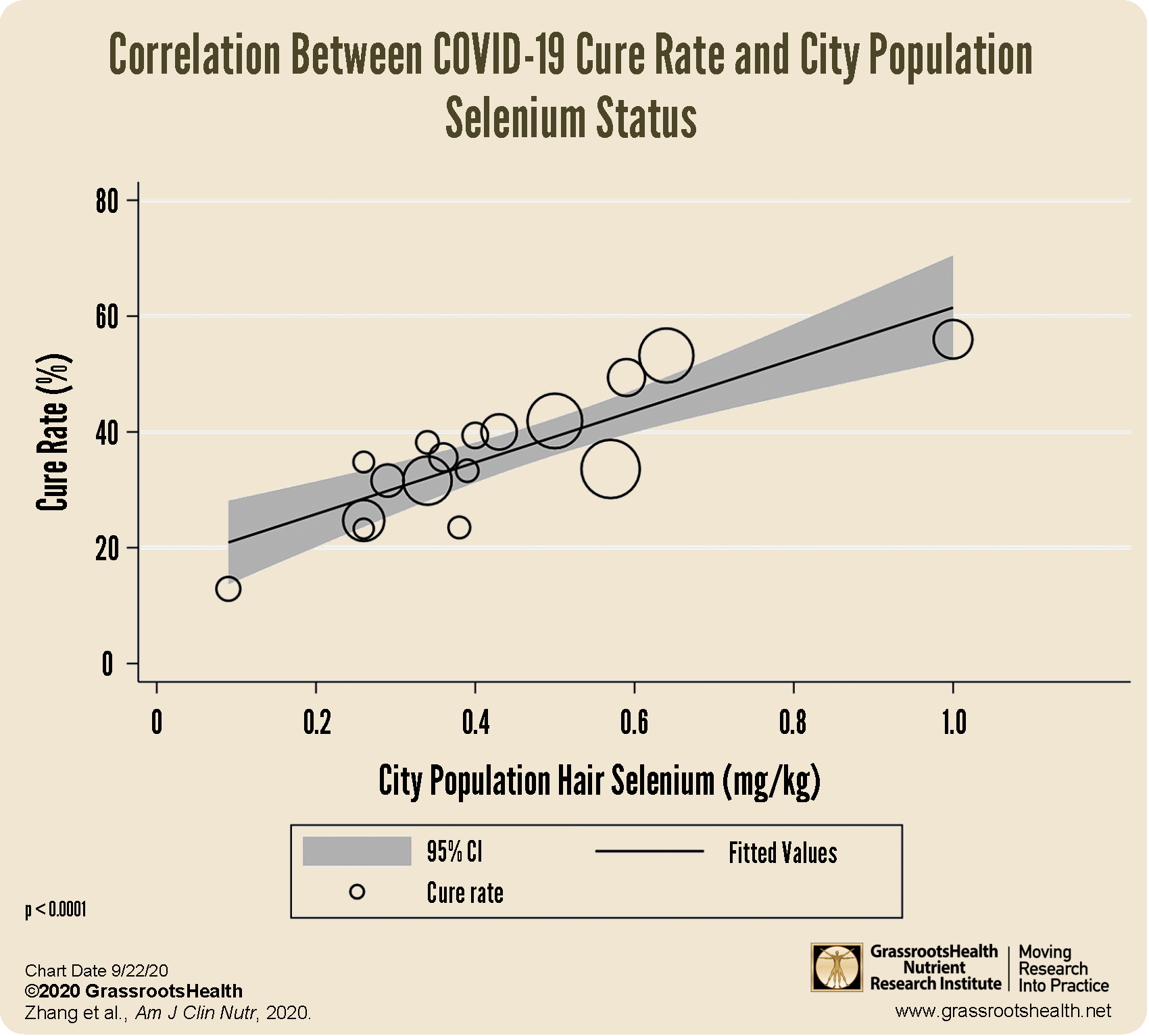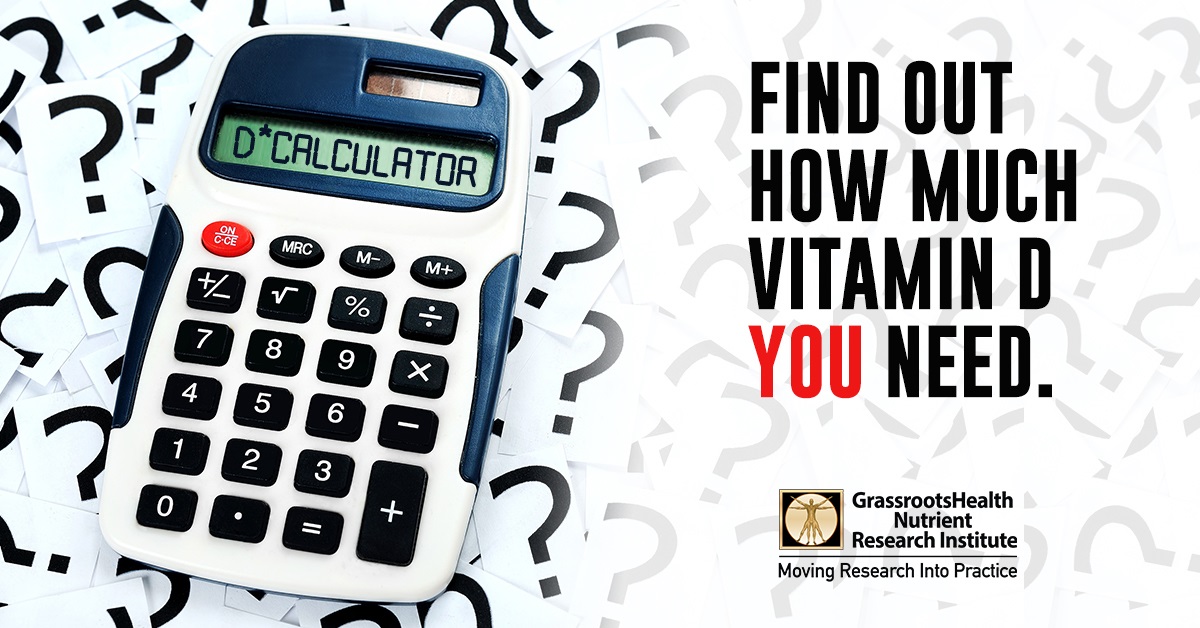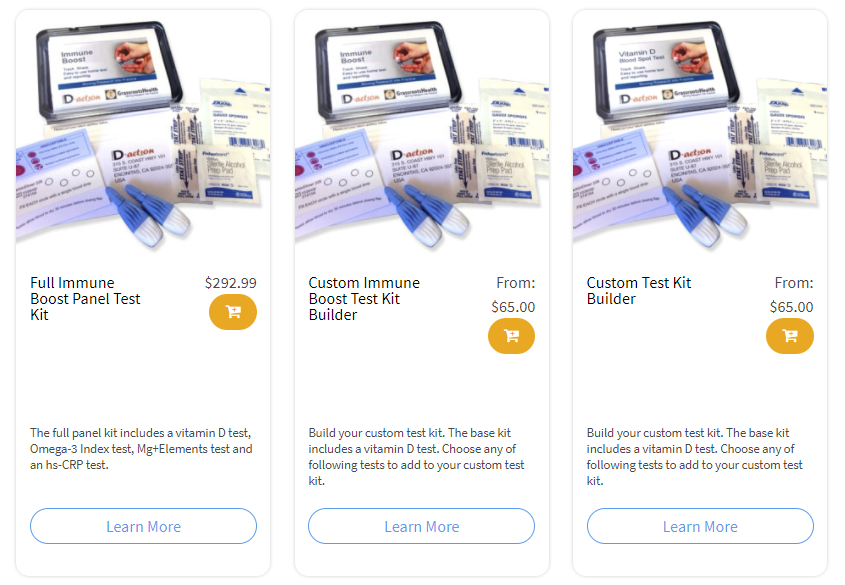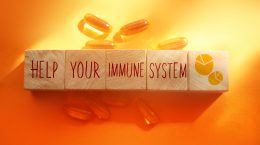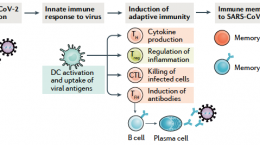Published on September 28, 2020
Researchers find significant correlation between COVID-19 cure and death rates, and population selenium status in China
Much of the information we have reviewed lately has focused on vitamin D and COVID-19 disease severity, however, many other nutrients are also well-known players in immune health and response to viral infections. Selenium is one of those nutrients; it is an integral component of glutathione peroxidase and thioredoxin reductase, two antioxidant enzymes that protect immune cells from oxidative damage that may occur during the immune response. Selenium is involved in T cell proliferation and antibody production. Selenium also influences the production of cytokines and eicosanoids — chemical messengers that regulate inflammation and immune cell function.
Could Selenium Levels Affect COVID-19 Disease?
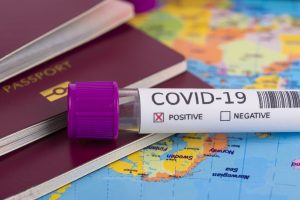 Several studies, such as those reviewed in a letter to the editor by Zhang et al., have related selenium deficiency to increased incidence of several different viral diseases and severity within certain populations. With this in mind, the authors conducted an analysis of COVID-19 cases and deaths from 16 cities within the province of Hubei, China, and 17 provinces and municipalities outside Hubei and compared that data to existing data on selenium status within each population. Their purpose was to see if there was any correlation between selenium status and the COVID-19 cure rate and death rate. Hair selenium concentration was the measure used since it was most readily available; hair selenium is highly correlated with selenium intake, similar to whole blood selenium (which is measured as part of the Elements Panel offered by GrassrootsHealth), however, hair levels represent longer-term exposure to selenium than whole blood selenium.
Several studies, such as those reviewed in a letter to the editor by Zhang et al., have related selenium deficiency to increased incidence of several different viral diseases and severity within certain populations. With this in mind, the authors conducted an analysis of COVID-19 cases and deaths from 16 cities within the province of Hubei, China, and 17 provinces and municipalities outside Hubei and compared that data to existing data on selenium status within each population. Their purpose was to see if there was any correlation between selenium status and the COVID-19 cure rate and death rate. Hair selenium concentration was the measure used since it was most readily available; hair selenium is highly correlated with selenium intake, similar to whole blood selenium (which is measured as part of the Elements Panel offered by GrassrootsHealth), however, hair levels represent longer-term exposure to selenium than whole blood selenium.
What did the authors find?
The authors found that the cure rate within Hubei province was statistically lower than all other provinces. They also found that one city within Hubei, a city well-known for its high selenium intake, had a higher cure rate than any other city within the province, at 36.4% (compared to an overall cure rate of 13.1% for the other cities combined, p<0.0001). When restricting the analysis to 17 cities outside of Hubei province, a significant association was found between the cure rate of COVID-19 and selenium status (p<0.0001), as shown in the chart below.
What does this mean?
It is important to note that the existing data on selenium status in each population was several years old, primarily from 2011 and could not be adjusted for age or other health conditions. However, the strength of the association at the city level suggests that further examination of selenium levels with relation to COVID-19 is warranted.
By now, our readers should be well aware that no nutrient works on its own to support our immune response and overall health. Selenium is just one of the nutrients necessary to help our immune system overcome disease.
In the spring of 2019, GrassrootsHealth started offering a selenium test with the Elements Panel, which includes testing your vitamin D level along with essential elements magnesium, selenium, zinc, copper, and copper:zinc ratio, and toxic heavy metals cadmium, lead, and mercury. This test reflects both free selenium in the blood and selenium as a component of selenoproteins (proteins containing selenium). Since heavy metals bind to selenium and reduce its bioavailability, this dried blood spot test is particularly useful for determining if enough selenium is present to counteract these heavy metals in the body. Among the 483 participants who tested their selenium levels as of June 2020, the average level was 196 μg/L. The laboratory reference range for whole blood selenium is 132-247 μg/L.
Are you getting enough selenium and other immune-essential nutrients?
Could a nutrient deficiency be putting a damper on your immune response? Find out by testing your vitamin D, omega-3s, magnesium and other essential elements (including selenium), as well as your inflammation levels, with the new Immune Boost home test kit offered by GrassrootsHealth. Measuring levels is the only way to know if you are supporting your immune system and whether additional changes should be made, with supplementation, dietary changes, or both.
Enroll now with the Full Immune Boost Panel (which includes tests for vitamin D, Omega-3 Index, magnesium, zinc, selenium, copper, and hsCRP), and get 10% off when you use coupon code BoostTen at checkout.
What Does it Take YOU to Get Your D to 40 ng/ml (100 nmol/L)?
Did you know your health could be greatly affected by making sure you have a vitamin D level of at least 40 ng/ml (100 nmol/L)? Help us help you.
STEP 1 – Do you know what your vitamin D level is? If not, be sure to test today to find out.
STEP 2 – Determine your target level. Are you at your target level? Experts recommend a level of at least 40-60 ng/ml (100-150 nmol/L).
STEP 3 – Need to boost your level? Use the D*calculator to see how much vitamin D it may take to reach your target. Opt for the Loading Dose for a quicker boost.
STEP 4 – Optimize how your body absorbs and utilizes vitamin D with co-nutrients and these simple steps.
STEP 5 – Re-Test! This is an important step to make sure you have reached your target level, and to ensure you are not taking too much! Re-testing after 3-4 months is recommended.
STEP 6 – Adjust, Repeat…
Give your immune system the nutrients it needs to support a healthy you and protect yourself from unnecessary diseases, especially COVID-19.
NEWS ALERT
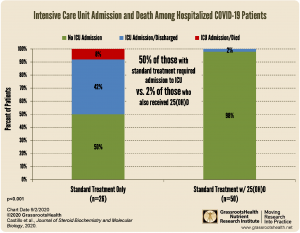 The first Randomized Controlled Trial on vitamin D and COVID-19 has shown a 96% lower risk of ICU admission for those receiving vitamin D (as 25(OH)D to quickly boost vitamin D blood levels) along with the standard treatment, compared to those receiving standard treatment alone.
The first Randomized Controlled Trial on vitamin D and COVID-19 has shown a 96% lower risk of ICU admission for those receiving vitamin D (as 25(OH)D to quickly boost vitamin D blood levels) along with the standard treatment, compared to those receiving standard treatment alone.
These results support many previous observational studies showing a relationship between vitamin D levels and intake and COVID-19 severity.
Review the Latest Nutrient Research for COVID-19
GrassrootsHealth Nutrient Research Institute has launched the new Immune Boost project with the use of our myData-myAnswers nutrient health system that nearly 15,000 people are already using for their health. Specific markers that influence immune health are suggested for testing as part of this project including:
- Vitamin D
- Omega-3 Index
- Essential elements magnesium, selenium, and zinc
- hsCRP
Our goal is to demonstrate how one can use the Nutrient Research Model established by Dr. Robert Heaney to show the effect of vitamin D serum levels of at least 40 ng/ml (100 nmol/L) on risk reduction for all ethnicities in the population. Status and intake of other nutrients will also be analyzed for any type of relationship to immune status and symptom severity. Join the project today!
Please let us know if you’re interested in helping sponsor this project.
CLICK HERE for updates and new information about the project.
Through GrassrootsHealth Nutrient Research Institute, you can also test your essential elements magnesium, copper, zinc and selenium, toxins such as lead, mercury and cadmium, as well as your omega-3 levels, inflammation levels and thyroid stimulating hormone (TSH) level. Find out your levels today! Log on to the test selection page (click the link below) to get your tests and see for yourself if your levels can be improved.
Make sure you track your results before and after, about every 6 months!
Click Here to Access the Test Page
How can I track my nutrient intake and levels over time?
To help you track your supplement use and nutrient levels, GrassrootsHealth has created the Personal Health Nutrient Decision System called
For each specific supplement, you can track what days you take it, how much, and many other details. This will help you know your true supplemental intake and what patterns of use work for you to reach and maintain optimum nutrient levels. Check it out today!


